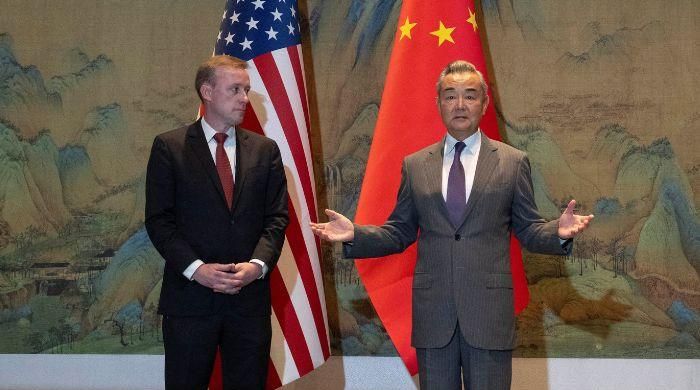BEIJING: Senior Chinese and US officials have discussed the possibility of further talks between Presidents Joe Biden and Xi Jinping in the near future, the two countries said during high-level meetings in Beijing on Wednesday.
The discussion came during lengthy talks between China's top diplomat Wang Yi and US national security adviser Jake Sullivan, held against the backdrop of sharp disagreements between the superpowers and the 2024 US election race to replace Biden.
The two sides also agreed to hold video calls between their military commanders responsible for hotspots in the Indo-Pacific region “at an appropriate time,” according to China’s statement on the meetings, a move Washington hopes could prevent conflicts in areas such as the Taiwan Strait. The White House said the talks would take place in the “near future.”
“The key to the smooth development of China-US interaction lies in treating each other as equals,” Wang told Sullivan, according to the state broadcaster. Closed circuit television.
“The two sides engaged in candid, substantive and constructive discussions on a range of bilateral, regional and global issues,” the White House said.
The remarks followed Sullivan's second day of talks with Wang and other officials aimed at calming tensions between the two superpowers ahead of the Nov. 5 U.S. election.
The meetings between the two parties will last until Thursday.
Wang told Sullivan that the US should “stop arming Taiwan and support China's peaceful 'reunification,'” adding that “Taiwan belongs to China and 'Taiwan independence' is the biggest risk to peace and stability in the Taiwan Strait.”
According to the Chinese statement, Wang also expressed Beijing's disapproval of US tariffs on a range of manufactured goods and export controls targeting Chinese chipmakers, saying Washington should “stop endangering China's legitimate interests.”
But a U.S. statement also highlighted some areas of potential agreement, noting “shared concerns about (North Korea), Burma and the Middle East.”
The United States also wants China to take further steps domestically to prevent the development of chemicals that can be converted into fentanyl, the leading cause of drug overdoses in the United States, and to reach an understanding on safety standards for artificial intelligence.
China, the world's second-largest economy, whose ships have repeatedly clashed with Philippine vessels in the South China Sea, said the United States “should not undermine China's sovereignty.” […] nor support the 'infringing acts' of the Philippines.”
Manila and Washington have a mutual defence treaty and the United States has pledged to help the Philippines against armed attacks on its ships and soldiers in the South China Sea.












